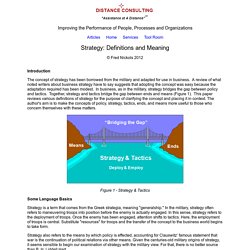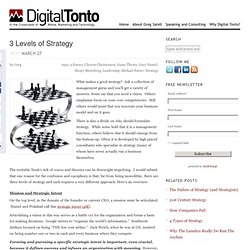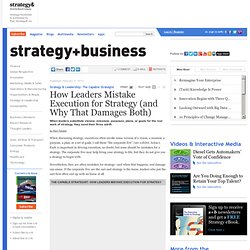

Don't Let Strategy Become Planning - Roger Martin. By Roger Martin | 8:00 AM February 5, 2013 I must have heard the words “we need to create a strategic plan” at least an order of magnitude more times than I have heard “we need to create a strategy.”

This is because most people see strategy as an exercise in producing a planning document. Strategy: Definitions and Meaning. Introduction The concept of strategy has been borrowed from the military and adapted for use in business.

A review of what noted writers about business strategy have to say suggests that adopting the concept was easy because the adaptation required has been modest. In business, as in the military, strategy bridges the gap between policy and tactics. Together, strategy and tactics bridge the gap between ends and means (Figure 1). This paper reviews various definitions of strategy for the purpose of clarifying the concept and placing it in context. 3 Levels of Strategy. What makes a good strategy?

Ask a collection of management gurus and you’ll get a variety of answers. Some say that you need a vision. Others emphasize focus on your core competencies. Still others would insist that you innovate your business model and on it goes. There is also a divide on who should formulate strategy. Mission and Strategic Intent On the top level, in the domain of the founder or current CEO, a mission must be articulated.
Articulating a vision in this way serves as a battle cry for the organization and forms a basis for making decisions. Forming and pursuing a specific strategic intent is important, even crucial, because it defines success and infuses an organization with meaning. Moreover, strategic intent is somewhat static. Strategic Moves On the next level down we have strategic moves. Strategic moves should be pursued with a specific strategic intent in mind. Analytical management gurus of the “positioning school” can be very helpful in guiding strategic moves. Why it’s Better to Have a Strategic Philosophy than an Ideology.
Do you have a philosophy or an ideology?

The answer to that question will very likely determine whether you will succeed or fail. Philosophies ask questions (sometimes annoying ones, which is why they made Socrates drink hemlock). Ideologies, on the other hand, determine answers. That seemingly nuanced distinction makes all the difference in the world. Most people prefer ideologies. The Artist and The Engineer It would be tough to find two people with philosophies as diametrically opposed as Bill Gates and Steve Jobs. Jobs thought holistically and wanted to build entire products. Both were, of course, incredibly successful, but neither was absolute. Their philosophies were not commandments, but merely indicated preferences. The Picasso Effect. Paris, 1907.

In a ramshackle studio in Montmartre, a twenty-six year-old Spanish artist presented the painting he had been working on day and night for the best part of a year to a small group of fellow artists, dealers and friends. They were visibly aghast. One considered the work “a veritable cataclysm”. Another concluded that its creator must be on the brink of suicide. Top 10 Mobile Banking Mistakes. How Leaders Mistake Execution for Strategy (and Why That Damages Both)
When discussing strategy, executives often invoke some version of a vision, a mission, a purpose, a plan, or a set of goals.

I call these “the corporate five” (see exhibit, below). Each is important in driving execution, no doubt, but none should be mistaken for a strategy. The corporate five may help bring your strategy to life, but they do not give you a strategy to begin with. Nevertheless, they are often mistaken for strategy—and when that happens, real damage can ensue. If the corporate five are the cart and strategy is the horse, leaders who put the cart first often end up with no horse at all. The Capable Strategist: How Leaders Mistake Execution for Strategy Booz & Company senior partner Ken Favaro explains to s+b executive editor Paul Michelman that when leaders substitute visions, missions, purposes, plans, or goals for the real work of strategy, they send their firms adrift. 1. To download, select your device: IBM, on the other hand, is an example of getting it right. The differences between goals, objectives, strategy, and tactics.
I was sitting in a meeting yesterday, and someone dropped the ‘s’ word… Yep – strategy.

This isn’t a bad word. But it becomes bad when it is used poorly. Often times (at least in the circles I travel), I hear strategy when people really mean tactics, or something else. Knowing the differences will not only make you a better business communicator, but it will also help you approach your work differently.